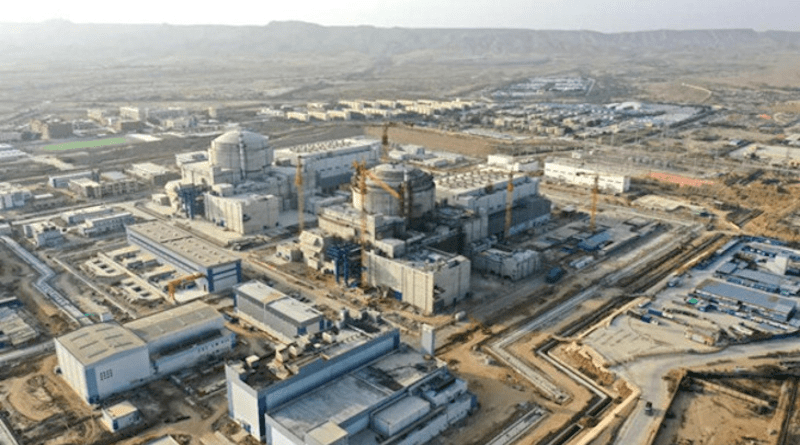Nuclear Energy: A Key Contributor In Saving Pakistan’s Foreign Exchange Reserves – OpEd
By Mommen Khan
Nuclear energy is considered a reliable source of energy because of its ability to generate a consistent and stable supply of electricity. Nuclear power plants can operate continuously for many years without interruption, providing a dependable source of baseload power. This means that nuclear energy can play an important role in ensuring a stable and secure supply of electricity, even during periods of high demand or when other sources of power are unavailable.
In addition, it is an efficient, reliable, and cost-effectiveness way to generate electricity because nuclear power plants produce no air pollution, and the waste they produce is minimal compared to other sources of energy which has the potential to reduce global warming. Around the globe nuclear energy is having 10% of the energy mix and it is rising to almost 20% in the advanced economies which portrays the rising importance of the peaceful uses of nuclear technology.
Pakistan as a responsible nuclear state, has been utilizing nuclear technology for the well-being of its citizens for more than five decades. Pakistan`s current economic crisis combined with increased dependence on imported fuel has resulted in an eight-year low foreign exchange reserves. Pakistan needs to utilize all viable options to save foreign exchange reserves. In this context, nuclear energy, which is significantly contributing in saving foreign exchange reserves, needs to be utilized for economic stability.
In recent years, the growing population growth coupled with, urbanization, and rising standards of living energy demand has increased in Pakistan. In addition, due to the catastrophic floods as a result of heavy monsoon rains one third of Pakistan is beneath the water and almost 33 million people have been affected. According to the World Bank the total economic damage exceeds 14.9 billion dollars followed by the need of at least 16.3 billion dollars for the rehabilitation and reconstruction. Although Pakistan is having 0.4 percent of the total share of carbon emission, it is ranked as the eighth most vulnerable country to climate change, thus raising the need for a clean and economical energy source.
In recent years, the domestically generated nuclear power’s contribution has increased in the national grid. Also, Pakistan has planned to prioritize this sector according to its 2030 agenda. According to Pakistan economic Survey in FY 2020-21 the gross capacity of nuclear energy plants was 2530 MW that provided 7076 million units to the national grid but within one year this capacity has showed a tremendous change in terms of both the capacity and units supplied to the national grid. In addition, the latter provided 12885 million units to the national grid and with the capacity of 3530 MW, it is evident from this change that investment in nuclear energy will give outcomes which can contribute to the sustainable growth of the sector.
Moreover, being a developing economy we should be prepared for any major economic disruption which can hamper our growth and development. During COVID-19 when there was a major disruption in the global trade and oil imports were affected, nuclear energy played a vital role by providing uninterrupted energy. K-2 has made a milestone by operating for 100 days continuously since its official operation date. This means that investing more in the energy generation from nuclear energy will allow the country to be prepared for any major economic downfall in the future by ensuring energy security.
In addition, According to Pakistan Atomic Energy Commision (PAEC), the average cost of nuclear energy generation in 2020-21 was 9.25 per unit which makes it second in the list of cheaper sources of energy generation in terms of per unit cost of production. In addition, pakistan has saved 1583.8 million dollar against the coal, $3033.6 million against refined furnace oil and $2168.7 million against RLNG, which shows the cost effectivenes of nuclear energy that by utilising this technology we not only tackle climate change, but also save our foreign exchange reserves which will result in decrease in the intensity of this crisis that pakistan is currently facing.
Pakistan must maintain its efforts to work for the peaceful application of nuclear technology in order to alleviate the country’s economic woes and energy crisis. The fact that nuclear energy has a clean history demonstrates Pakistan’s dedication in using nuclear energy for peaceful purposes. Pakistan has demonstrated that it is a responsible nuclear state, with an unblemished record of preserving the safety and as well as the security of its nuclear infrastructure.
Pakistan is indeed a distinctive member of the IAEA, having been on the board of governors twenty-one times and chaired it twice, Pakistan’s credentials are of a responsible nuclear state. Pakistan prioritizes the security of its nuclear infrastructure. Therefore, Pakistan should continue investing in its nuclear energy generation to get clean, cost-effective and reliable energy which not only will allow it to cope up with the catastrophic effects of climate change, but also contribute to resolve the deepening issue of depleting the foreign exchange reserves, and economic growth.
Mommen Khan is working as Assistant Research Fellow at Balochistan Think Tank Network (BTTN), Quetta.

